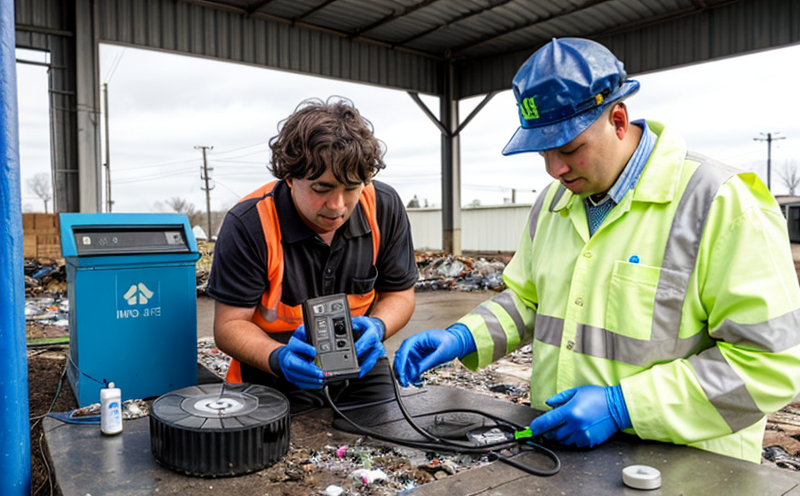ASTM D8299 Cobalt Content in Waste Batteries
The testing of cobalt content in waste batteries is a critical process within the realm of electronic waste and battery recycling. This service, compliant with ASTM D8299, focuses on ensuring that the recycled materials meet stringent environmental standards and regulatory requirements.
As quality managers, compliance officers, R&D engineers, or procurement specialists involved in waste management and recycling testing, understanding the nuances of this process is essential. The ASTM D8299 standard provides a framework for accurately determining cobalt content levels in waste batteries, which can vary widely depending on battery type (lithium-ion, nickel-cadmium, etc.), age, and recycling method.
Waste batteries represent a significant source of valuable metals such as cobalt. Efficient recovery of these resources not only supports sustainability goals but also reduces the environmental impact associated with mining new materials. By accurately assessing cobalt content, we can optimize extraction processes to maximize resource efficiency while minimizing waste.
The testing process begins with proper specimen preparation. This involves selecting representative samples from batches of waste batteries, ensuring that each sample is homogeneous and representative of the entire batch. The chosen method for preparing these specimens will depend on the battery type but typically includes mechanical crushing followed by sieving to achieve a consistent particle size.
Once prepared, the samples are analyzed using precise analytical instruments capable of detecting trace amounts of cobalt. Commonly used techniques include inductively coupled plasma optical emission spectrometry (ICPOES) and inductively coupled plasma mass spectrometry (ICPMS). These methods offer high accuracy and precision necessary for compliance with ASTM D8299.
The results from these analyses are then compiled into detailed reports that provide not only the cobalt content but also other relevant parameters such as total metal recovery rates, impurity levels, and potential contamination risks. Compliance officers can use this information to ensure their recycling operations adhere to regulatory standards set forth by organizations like OSHA, EPA, and REACH.
R&D engineers benefit from this service by gaining insights into how different factors influence cobalt content in waste batteries, which could lead to innovations in recycling technologies or improved processes for extracting valuable metals. Procurement professionals can leverage the data obtained through ASTM D8299-compliant testing when evaluating suppliers of recycled materials.
It is important to note that accurate determination of cobalt content plays a crucial role in ensuring that recovered materials are suitable for further use, whether it's for manufacturing new products or simply meeting environmental discharge limits. Non-compliance could result in penalties and reputational damage; thus, adherence to standards like ASTM D8299 is vital.
By leveraging state-of-the-art equipment and experienced personnel, Eurolab ensures reliable and accurate results that meet the highest industry standards. Our commitment to quality guarantees clients peace of mind knowing they are receiving trustworthy data upon which crucial decisions can be based.
Applied Standards:
| Standard | Description |
|---|---|
| ASTM D8299-15 | This standard specifies a method for determining the concentration of cobalt in spent rechargeable batteries containing lithium-ion, nickel-cadmium, and other chemistries. |
| ISO 6399-4:2017 | An international standard that complements ASTM D8299 by providing additional guidelines for sampling procedures before analysis begins. |
The combination of these standards ensures comprehensive and consistent results across various testing scenarios.
Applied Standards
| Standard | Description |
|---|---|
| ASTM D8299-15 | This standard specifies a method for determining the concentration of cobalt in spent rechargeable batteries containing lithium-ion, nickel-cadmium, and other chemistries. |
| ISO 6399-4:2017 | An international standard that complements ASTM D8299 by providing additional guidelines for sampling procedures before analysis begins. |
The combination of these standards ensures comprehensive and consistent results across various testing scenarios.
Eurolab Advantages
At Eurolab, we pride ourselves on delivering unparalleled service excellence in waste management and recycling testing. Our expertise lies not only in providing accurate and reliable test results but also in offering tailored solutions that meet the unique needs of each client.
Our highly skilled team leverages cutting-edge technology to ensure precision and consistency throughout every stage of the testing process. From specimen preparation through final analysis, our methodologies adhere strictly to internationally recognized standards such as ASTM D8299 and ISO 6399-4:2017.
We understand that time-to-market is crucial for businesses operating in this competitive industry. That's why we offer expedited turnaround times without compromising on quality or accuracy. Our commitment to excellence extends beyond just delivering results; it includes fostering long-term relationships built on trust and mutual respect.
Our clients benefit from our extensive network of contacts within the recycling sector, allowing us to stay ahead of emerging trends and regulations affecting this rapidly evolving field. By staying informed about best practices and regulatory changes, we ensure that our services remain relevant and effective for years to come.
Competitive Advantage and Market Impact
- Compliance with leading international standards like ASTM D8299 ensures reliability and trustworthiness of results.
- Precision instruments combined with experienced personnel guarantee accurate measurements that are crucial for decision-making processes.
- Adherence to strict sampling protocols as per ISO 6399-4:2017 enhances the credibility and reproducibility of findings.
- Expedited turnaround times without sacrificing quality provide a competitive edge in meeting tight deadlines imposed by regulatory bodies or internal projects.
These advantages contribute significantly towards establishing Eurolab as a leader in waste management and recycling testing services, particularly for electronic waste and battery recycling. Our reputation for delivering top-tier results has made us the preferred choice among quality managers, compliance officers, R&D engineers, and procurement professionals alike.





